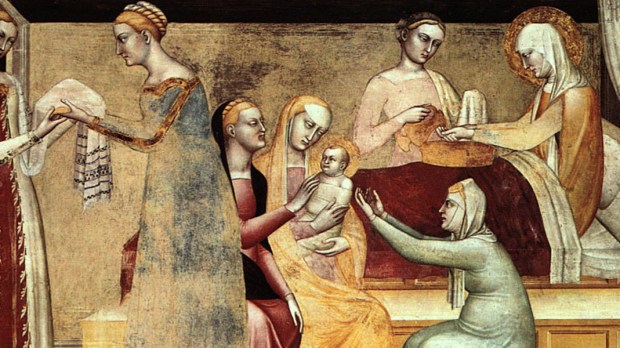“Your birth, O Virgin Mother of God, proclaims joy to the whole world, for from you arose the glorious Sun of Justice, Christ our God; he freed us from the age-old curse and filled us with holiness; he destroyed death and gave us eternal life.” – Antiphon for the Canticle of Zechariah, Morning Prayer for September 8
On this feast day honoring the birth of Mary, Mother of God, the Gospel reading contains the genealogy and Annunciation from Matthew — the whole list of patriarchs and fathers, with the occasional mention of the mother:
“Judah became the father of Perez and Zerah, whose mother was Tamar. . .Salmon the father of Boaz, whose mother was Rahab. Boaz became the father of Obed, whose mother was Ruth. . . .David became the father of Solomon, whose mother had been the wife of Uriah. . .”
It goes on like that, and then,
“Achim the father of Eliud, Eliud the father of Eleazar. Eleazar the father of Matthan, Matthan the father of Jacob, Jacob the father of Joseph, the husband of Mary.
A genealogy goes down the line and then suddenly, there is a twist; suddenly a man is named, but he is not noted as the father or someone, or the son of someone but as the husband of the mother, who is — O mystery — the Mother of Completeness, the Mother of Our Creator, the Mother of the Christ.
“Mary is the Mysterious Book of Predestination to glory.” -St. Frances Xavier Cabrini
A subtle twist in the narrative signals that everything is different, now. There is a giant spike driven into the line of patriarchy, here; suddenly it is not the father who matters most, but the Mother, and before Jesus is even conceived — before he was “knitted in secret, in the womb” and taking his own flesh and blood from Mary’s — we understand that nothing will ever be as it was.
Consider:
In the beginning was the Word, and the Word was with God, and the Word was God. – John 1:1 In the beginning, when God created the heavens and the earth, the earth was a formless wasteland, and darkness covered the abyss, while a mighty wind swept over the waters. Then God said, “Let there be light,” and there was light. -Genesis 1:1-3
Both of these verses describe something from nothing — voids and spaces. In March, when we are thinking about the Annunciation, they could well describe the condition of Mary’s virginal womb, but perhaps, on this day, we can also contemplate these words as describing Mary’s soul at the time of her conception. The God of No Accidents, who Is, Was, Ever Shall Be, the God who breathed forth Creation with its Incarnational mirror already in place, knew his Vessel. He knew from whence the Ark of his New Covenant would come, for he would provide it, and in the necessary pristine condition.
Gabriel called her “full of grace.”
If we think back to those lines from Genesis, and John, we can almost consider Mary-in-utero to be a sort of mirror of the quiescent “nothing” that existed before Creation. A created creature, loved into being and marked by grace, lies waiting to be born. She lives and grows obscurely, still this model of quiescence.
From the stillpoint “nothing” of Mary’s physical and spiritual blank sheet comes the rest of the story. Salvation. Return. The Way. Back to where we started.
“Never be afraid of loving the Blessed Virgin too much. You can never love her more than Jesus did.”
-St. Maximilian Kolbe
Why is Mary so important to Catholics? Why do we honor her so greatly and call her “Blessed”? Why do we even go to the trouble to recall her birth? She was “just a woman,” right?
Well, no. She was “full of grace.” She would have to be. I am just a woman. Billions of people are “just women,” and most of them are good, decent people, but could any of them have been the exceptional vessel meant to carry, nourish, enflesh and deliver to the world its Creator and Savior?
Mary’s goodness was by no merit of her own; she was given the grace to be this pristine entity. She was given the grace, also, to say “yes” to Gabriel, when a “no” would have been perfectly understandable, given her age and era. She acknowledges all of that in her splendid Magnificat in the Gospel of Luke.
“Angels constantly guard the clients of this Blessed Virgin from the assaults of Hell.” -St. Gertrude the Great
But we remember and celebrate the fact of her birth because — whether merited or not — she was the one chosen by God to ignite a force that still burns in mankind.
It all began when it began. But the beginning of Completeness is what we celebrate today, when we celebrate the birth of Mary, the Theotokos, the God-bearer. The sublime Mother whom Jesus, at the foot of his cross, gave to every one of us.
“The Father takes pleasure in looking upon the heart of the most holy Virgin Mary, as the masterpiece of his hands.… The Son takes pleasure in it as the heart of His Mother, the source from which He drew the blood that … ransomed us.” — St. John Vianney

